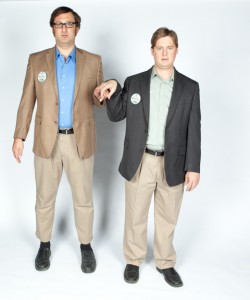 “You guys want some coke?”
“You guys want some coke?”
That’s pretty much the first thing I hear from Eric Wareheim as I walk into a posh hotel room in Atlanta to talk to him and his partner Tim Heidecker about their first feature film, Tim & Eric’s Billion Dollar Movie. They were talking about soda of course as — this being Atlanta after all — the room was well stocked with the little bottle-shaped aluminum cans. When I asked if the boys might stop by The World Of Coke while in town, I then had to explain exactly what interest a museum/tourist attraction about sugar water might hold. Tim seemed kinda into it.
Regardless, soon I found myself (with two other guys who didn’t seem to know what was going on, or have many questions ready) talking to Tim Heidecker and Eric Wareheim in person. I’d spoken to them over the phone twice before, though I’d call neither interview particularly successful. Even still, as a big fan of the duo’s aggressive and bizarre Awesome Show! I’ve always enjoyed talking to them, even when it was clear they had other things they’d rather be doing (editing this movie, in the case of our second talk). In person I found the two much easier to talk to, as they were pretty happy to engage about the actual movie, the marketing process, and its hybrid VOD/theatrical release. I can only imagine how tough it would be to maintain an aggressive comedic tone when you’re being ground through the marketing machine for several weeks, so really it seemed like I was talking to Tim and Eric just as they are: two dudes that find weird shit funny.
It was obvious almost right away that the two picked up on the fact that I knew the show pretty well, while the other guys were less familiar. This led to an interesting conversation about differing perspectives on their film, with some feeling it’s closer to being traditional while others find it aggressive and shocking.
Here’s our talk (my questions are in green)…
++++++++++++
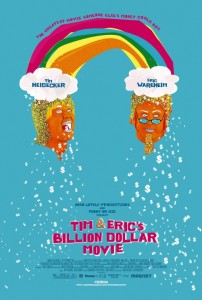 To ease in, just tell me a little about the writing process for this movie, as opposed to the work you guys have done in the past.
To ease in, just tell me a little about the writing process for this movie, as opposed to the work you guys have done in the past.
Tim: Well, we tried to take our time. We knew we didn’t want to make a sketch movie, we didn’t want to make a long episode of the Awesome Show! so we tried to focus on coming up with a story that would fit our sensibility and not clog it up with too much plot. You know, just something that would let us make a movie where we could do everything we wanted to do, all of our little tricks and stuff. It was a back-and-forth, working on it for quite a while, getting it into a good position where we had something we could shoot the movie with and then we’d probably spend a lot of time editing it and changing it.
Did you guys have any trouble adapting from the shorts to a full-length feature film?
Tim: No trouble, just that it was a challenge. We didn’t really consider it “adapting,” just doing something different. It was work but… you know, so is anything you care about.
People can already watch it on VOD and stuff like that, so what was the decision process on going that route?
Tim: Well that’s a decision from Magnolia/Magnet, that’s just how they release all their films. It wasn’t our decision and it was a decision that confused us at first, but since it’s happened it’s been great for multiple reasons. It’s allowing the film to be seen by way more people, than if it only had a limited indie theater release. There’s a lot of people out there that are very savvy and know how to do it, and then there are people that aren’t going to be aware and will go and see it in a movie theater in traditional ways.
I’m curious then– it’s become sort of the de facto standard in the last two years to do this hybrid release with the VOD coming a month or a few weeks before the theatrical, which I haven’t entirely wrapped my head around. But have you guys experienced screenings now with people that have already seen the film, and is that affecting the dynamic?
Eric: No, it’s interesting that most of the people at the screenings we’ve been too have not seen the film yet, and want to see it in a theater. And word on the street is a lot of people are waiting, which is awesome. The way this is rolling out I think is good for people that don’t go to the movie theaters, since it’s not going to be as easy for someone in Miami to go see it.
Tim: Yeah, our thing about this movie is that it’s going to be around for years and years and years, so people are gonna discover it all kinds of different ways. There’s no cost in putting it out right now, it’s not like you’re renting physical space or anything, it’s just these sites. So it is a weird thing, it’s just so new it doesn’t make sense sort of, but even from a practical PR standpoint, we’ve seen it in real time where the shelf life of this release has doubled because there was all kinds of press happening leading up to the VOD release, and now there’s press happening leading up to the theatrical release. People are still being reverent or respectful of the idea of the theatrical release, and a lot of bigger papers and traditional news outlets are really only talking about the theatrical release. It’s capturing a bigger audience.
Two for one kind of thing, gotcha. So going back to the film itself, during the writing of it, how did you determine what quirks and editing techniques you would or would not carry over from Awesome Show! and to what degree you would push or pull back with any of them.
Eric: Thats a good question- we definitely knew we weren’t going to cut as fast as Awesome Show!, or have that kind of look. We wanted it to look like a movie, we wanted you to be in a movie theater and have somewhat of a cinematic experience, even some parts like the Johnny Depp movie that would have a heightened sort of Hollywood look, and then for the rest of the movie we wanted to have a higher production value. But at the same time wrote a bunch of those “Understanding Your Movies” which feel very Awesome Show!, you kind of cut out to that and are thrown for a loop and then cut back in. Just like the commercials, we knew we were going to have a couple of commercials in there that would have our style of editing, the “Tim & Eric” style of editing.
Tim: The basic rule is basically “what makes sense?” so if you’re making a shitty commercial then it makes sense for it to be a shitty commercial, but if you’re just in a narrative telling a story, then it doesn’t make sense for it to be all shitty and weird. We want you to forget about the form until it makes sense in the scene.
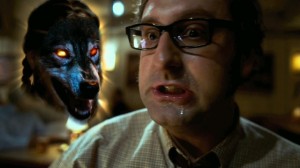 You guys have sort of a very niche audience, but how do you want everyone else to see it since not everyone is familiar with Tim & Eric. It’s kind of extreme, the movie itself.
You guys have sort of a very niche audience, but how do you want everyone else to see it since not everyone is familiar with Tim & Eric. It’s kind of extreme, the movie itself.
Tim: Well generally the only thing we’re doing different — or maybe more the distributor is doing different — is that we’re just doing a lot of press. We’re talking to as mainstream press as you can get. It’s different from your normal film I guess but, you know, it should be treated like anything else, it’s just a little different. It’s not a remake of something, it’s not an animated CGI piece.
Eric: At the same time our objective is not for it to do well in the mainstream- of course we want lots of people to see it, but our objective was to make “our” movie, which we succeeded in.
When you first started the process, was there ever any temptation to go for a full-blown, Lynchian, crazy bizarro, small audience movie that wouldn’t be as — to a relative degree — accessible as this film?
Tim: Yeah, those two questions are so interesting next to each other because one perspective is “this is so crazy, how are you going to get enough audience?” and the other is the opposite. So from a super-fans perspective they may say like, “yeah, you guys made this traditional movie” so yeah, in that sense we kinda found a middle ground there. We knew we couldn’t get a movie made if it was going to be just completely out the window, bonkers and that’s probably not a movie we really want to make anyways. To spend 90 minutes and all that time and all that money and all that opportunity to kind of wank off, feels like a missed opportunity.
Obviously there are people from your show in the movie, and then some folks from your show that didn’t really make it into the movie. How did you go about choosing which of your regulars would be a part of this movie?
Eric: We just wrote the movie with characters, and then assigned people to those characters. It was just whoever fit, and there’s a lot of people who didn’t get in there and people who wanted to get in there.
Tim: There was just too many people we wanted to have in the movie, and there aren’t enough places for it. We didn’t want this to be a parade of cameos necessarily, so it was striking a balance and hoping that if we get to make another movie we can include other people. This isn’t meant to be the time capsule of all things we care about.
If you got an opportunity to do more, would you want to continue with this particular narrative… timeline… Tim & Eric “continuum” as it is, or would you want to collaborate on some kind of different approach. I don’t know if that makes sense.
Tim: Yeah.
Eric: We’d love to make another Tim & Eric movie, if this one does well. Something in the style of this.
Tim: It’s sort of confusing because the way this movie ends, I’m not sure how you would continue it because there’s the sort of ending of the movie within the movie, but then there’s this other ending. So I don’t know if it would continue from the screening room or if it would evolve.
You’ve got such amorphous Tim & Eric characters that are sort of you and then are not, so you could get away with whatever you’d want.
Tim: Yeah, we can kinda do anything we want, probably.
Was there every any ideas you had that you couldn’t do because they were too extreme for the studio bounds.
Eric: I don’t think so, I mean, we got away with some crazy shit.
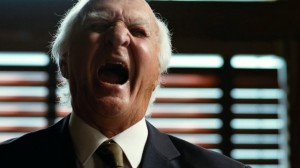 If you guys had a billion dollars to make a movie, what would you put in it?
If you guys had a billion dollars to make a movie, what would you put in it?
Tim: We’d give probably 99% of it away. Charity… No, the problem with having lots and lots of money for a movie is that’s someone else’s money, so there going to want it back and going to try and fuck with it so they make it as accessible to the most people possible, which results in garbage.
I don’t think Robert Loggia in your film is probably too far removed from some studio execs.
Tim: Haha, yeah, exactly.
So when you make this film, which is still grounded in your aesthetic obviously, but is fully a motion picture, logistically in terms of making a feature with that toolset — these kinds of cameras and lighting and workflow — how big of an adjustment was that for you guys?
Tim: Well, we had made these two bigger short films Father & Son and The Terrys for Funnie Or Die, and really the process isn’t that different when you’re doing short stuff or long stuff, it’s just more days. The general fundamentals of filmmaking still apply, so that was pretty much it. We had great producers, a great cinematographer, a great 1st AD, that’s what ends up mattering is having a good team. We had a couple of people that had made a movie before so they knew the workings around of all the technical and all that kind of boring stuff, but yeah, it’s just trusting your instincts, working with good people, making sure things are in focus…
Gotcha. So you both have pretty singular bodies of work individually, so how do you guys balance and determine how much of your day or week or month or year is Tim & Eric time and how much you devote to side projects?
Eric: Well, it’s sort of like weekend projects, the other stuff. We’re pretty focused on the Tim & Eric stuff the last seven years. As with anybody you have a lot of outside interests and you want to be creative and do different things.
So Tim & Eric is sort of the 9 to 5 and everything else fits in around it? I hear you.
Is there anyone out there with a similar aesthetic that you’ve talked about working with?
Tim: That’s a good questions, we’ve talked a little bit about working with Peter Serafinowicz and Robert Popper from England who do the Look Around You Show but everybody’s stuff is so personal, it’s hard to even consider working with other people. As far as talent, we’ve worked with everybody we want to work with. A couple people like Christopher Guest- I think we’d be too intimidated, that’d be too nerve-wracking.
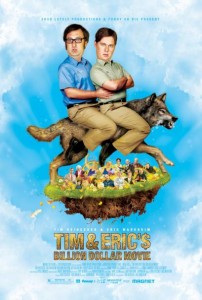 So from where you guys sit, what has the reaction been to the movie at your screenings with some fans expecting a Lars Von Trier movie and others…
So from where you guys sit, what has the reaction been to the movie at your screenings with some fans expecting a Lars Von Trier movie and others…
Tim: I think it’s been overwhelmingly, surprisingly positive. The tweets that I’ve been getting I’d say are like 10, 15, 20 to 1 positive.
Eric: Yeah, if you look on iTunes, there’s 600 five-star reviews right now. A couple one-star reviews but you know, our fans took to the net and downloaded this thing and really have shown a lot of love to it. I think we’re still in the stage of like going to these screenings and it’s all fans, which is a really nice thing, but I think once it comes out in theaters…
Tim: There’s gonna be a certain group of fans waiting for this movie for two years since we started making it, have all kinds of expectations for it, want it be a certain way and want it to be like the show and are going to be disappointed, but then there are people that see it and have a first reaction and see it again and have a different reaction. Somebody said they’d downloaded it and thought it was pretty funny, and then saw it at a screening with an audience and had a completely different reaction. So like I said earlier, I think this is a movie that’s going to have a long life-span. People are going to see this that have never experienced our show and this is going to be what they associate with us, it’s going to be a weird thing. But it’s been good and the most reasonable people I’ve heard have said, you know, “we laughed, we enjoyed it.. it was really funny… so congratulations to you.” Haha. It’s all it’s meant to be, it’s not gonna change cinema’s history or anything.
+++++++++++++++++
You can see the film on VOD right this second, or catch in a theater in one of 20 markets starting Friday, March 2nd.
Twitter
Comment Below
Message Board